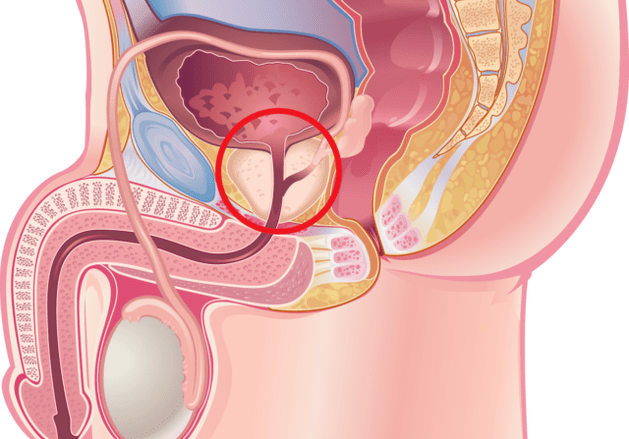Inflammation of the prostate gland or prostatitis ICD is highlighted in the list below some numbers. It all depends on the form of the pathology and the nature of its origin.
What is an ICD
There are regulatory documents used in the medical community that are periodically reviewed by the World Health Organization. This includes a list of all diseases and pathologies that occur in humans. It is called the International Classification of Diseases (ICD). Its main goal is to provide assistance in studying the patient’s condition and creating optimal conditions for this by systematically registering the available data. Information is collected from around the world and coded with specific pronunciations. At any time, it can be added and taken for further study.
Important! The ICD table contains classes and groups marked with codes. One title can contain several forms and manifestations of the same disease. Entries are arranged in alphabetical order for convenience.

Prostate gland disease according to ICD-10
The list of diseases includes:
- acute prostatitis ICD 10 41. 0;
- chronic prostatitis ICD 10 41. 1;
- prostate abscess - 41. 2;
- prostatocystitis - 41. 3;
- other inflammatory conditions of the prostate - 41. 8;
- unspecified inflammatory diseases of the glands - 41. 9.
Ordinary people do not need to know ICD coding. Only a doctor can decipher and complicate the diagnosis.
Prostatitis according to ICD-10
Code of prostatitis according to ICD 10 - 41. If benign hyperplasia develops in the organ, then the disease is prescribed by a different number. Adenomas of the prostate gland code according to ICD 10 in adults are registered with numbers 40 to 51. This title covers various fibromas and fibroids.
It belongs to the urological diseases that most often strike men at any age. In general, the inflammatory process in the glandular tissue is most often observed in a chronic form without any visible acute signs at first.
Experts classify diseases according to the type of course:
- acute, occurs in 50% of patients not older than 30-35 years. Most are related to bacterial infections;
- chronic. It does not manifest itself for a long time and can develop against the background of infectious processes.
Because of that incident, it happened:
- bacteria that occur in organs;
- non -bacterial, in which pathological changes occur in a chronic form;
- viral, in which the entire genital area suffers.
By the nature of structural change, they are distinguished:
- fibrous shape. The growth of glandular tissue occurs relatively rapidly and requires radical treatment. Clinically similar to ICD prostate adenoma in which 40. 0;
- calculate. It occurs when calculi form in the tissues of the glandular organs. It is considered a cause of cancer;
- stagnant form. Occurs with physical inactivity, prolonged abstinence from sexual intercourse.
Causes and symptoms
Glandular pathology, chronic and acute, is directly related to improper lifestyle behaviors, smoking and alcohol addiction, and poor physical activity.
The main reasons why the disease develops even in young men are:
- infections transmitted during sexual intercourse: gonococci, Escherichia coli, chlamydia, etc. Frequent sexual partner changes increase the risk of developing the disease;
- congestion in the pelvic organs associated with impaired blood circulation;
- inactive, inactive lifestyle, physically inactive;
- prolonged abstinence from sexual intercourse, abuse of drugs that prolong sexual intercourse, intentional delay of ejaculation during intercourse to prolong it;
- decreased immunity;
- psycho-emotional stress, severe stress;
- physical work;
- hypothermia;
- failure in the endocrine system;
- unbalanced diet;
- addictive.
The signs of the development of acute and chronic inflammation of the prostate are similar. The doctor will help identify this form of the disease after examination and diagnosis.
Specificity
The acute form is accompanied by severe clinical symptoms, and all tissues of the glandular organs are involved in the pathological process. Therefore, the disease is painful, difficult: with an increase in body temperature, signs of general intoxication.
Patients complain about:
- heaviness and pain in the groin, pelvic area, lower back;
- feeling of redness of the rectum;
- increased desire to urinate, including at night;
- pain in the urethra after ejaculation and emptying of the bladder.
In the form of chronic diseases of the lower abdomen, some men experience pain of varying intensity, problems with erection and potency. In 95% of cases, the disease is practically asymptomatic.

ICD code for acute and chronic prostatitis
ICD Code 41. 1 chronic prostatitis with any adverse factors can worsen. Acute inflammation of ICD 41. 0 causes edema of glandular tissue, which is fraught with acute urinary retention.
Such diseases, in the absence of proper treatment, cause serious complications:
- bladder obstruction;
- the development of male infertility;
- narrowing and scarring of the urethral canal;
- recurrent cystitis;
- pyelonephritis and other diseases affecting the kidneys;
- swelling of glandular tissue, requiring immediate medical intervention;
- sepsis, which most often develops in people with weakened immunity.
Pathological diagnosis
In some cases, a single rectal examination and familiarization with the patient’s complaints are sufficient to make a diagnosis. However, inflammation is diagnosed primarily using laboratory and instrumental examination methods.
Patients referred:
- blood and urine tests to determine infection and inflammation;
- analysis of prostate secretion;
- ultrasound examination of the prostate, kidneys, bladder;
- uretrocytoscopy;
- MRI of the pelvic organs;
- PSA blood test;
- biopsy;
- X-ray.
One of the most effective diagnostic methods is digital examination of the rectum on the prostate. Even in the acute form, this organ is very sensitive, and the procedure can cause severe pain to the patient.
Treatment tactics
Chronic prostatitis, the ICD code listed in the international register of diseases, requires complex treatment. Patients are advised to correct diet, change lifestyle, stop harmful addictions, and start eating properly.
Also appointed:
- Medicine. It helps relieve pain, relieve inflammation, activate the regrowth of cells of damaged glandular organs. Suppositories are used mainly, as well as antibiotics.
- Prostate massage. It is considered the most effective method of getting rid of stagnant processes in the glands. It is carried out independently or with the help of specialists. This procedure is considered unpleasant, but must be performed without fail.
- Balneotherapy. With the help of mineral waters in the sanatorium, men managed to overcome the chronic form. It is useful to drink healing water and bathe in it.
- Physiotherapy. Thermal physiotherapy gives excellent results. It helps assimilate medication quickly, relieves general symptoms, and improves blood circulation in troubled organs.
- Diet is an important step in therapy. The healing diet should contain vitamins, fiber, amino acids, and mineral compounds. You should refrain from snacks (pickles, marinades, smoked meats, fried, fatty foods). The list of desired products includes sour milk drinks, lean meats and fish, nuts, dried fruits, pumpkin seeds.
Surgery is rarely used for chronic inflammation, when other methods of treatment do not give a positive effect or a purulent process has begun.
Acute requires the use of medications, the use of microclycerers, rectal suppositories, analgesics, painkillers. Patients were shown bed rest and rejection of intimate intercourse. Once the acute period has passed, prostate massage and physiotherapy are prescribed. It is very important for this type of disease to choose the necessary medication. This is only possible after a proper diagnosis. What kind of funds will be prescribed, and how many doses, experts say.
Prophylaxis
In order not to develop and worsen prostatitis, ICD code 10 in adults is listed at number 41, you must adhere to the following rules:
- lead an active and healthy lifestyle. If it is not possible to visit the gym, it is necessary to do morning exercises, warm up during working hours, and walk more. This type of gym will serve as a staircase, where a person climbs daily to his apartment;
- avoid body hypothermia: do not sit on cold surfaces, dress for the weather, etc . ;
- with constipation, including foods that weaken the intestines in food, take mild laxatives. If the disorder persists, it is recommended to see a specialist;
- regulate sex life. Prolonged sexual abstinence is the first step towards the development of glandular disease. If there is no permanent sexual partner, you can replace it with temporary masturbation, but you should not engage in this activity;
- avoid intercourse without contraceptive interference. Sexually transmitted diseases may not be noticed at first, but they severely damage the glandular tissue, causing a form of infectious prostatitis;
- if you suspect a sexually transmitted infection, you should see a venereologist or urologist. Enough to undergo an examination to find out what is the cause of the unpleasant symptoms;
- it is necessary to visit a urologist at least once a year to exclude the possibility of the occurrence of this disease.
Reviews
- "International classification is not important in the treatment of prostate inflammation of any etiology, because the ICD code 10 allows you to accurately determine the type of disease, formulate a diagnosis and perform effective therapeutic measures. "
- "My father had prostate adenoma. The ICD code was deciphered by the doctor when he was determined with the diagnosis. The level was quite negligible, the glands almost tripled. Surgery was scheduled and successful. His recovery was delayed, because age (over 60 years) and other chronic diseases made themfeel. Now he has no complaints about the genitourinary system ".
- "Chr. Prostatitis ICD 41. 1 is on my card. I have long suffered from this disease, but it is very rare, because I do everything to prevent the onset of acute symptoms. Doctors say that the chronic disease is not gone, it may not appear ina long time, if you monitor your health properly. So I do sports - I run in the morning every day, do exercise, don't drink alcohol, don't smoke. "
























